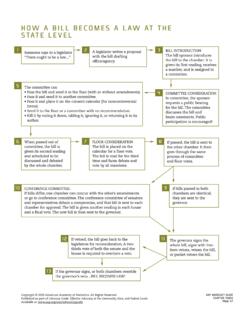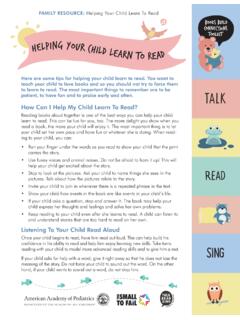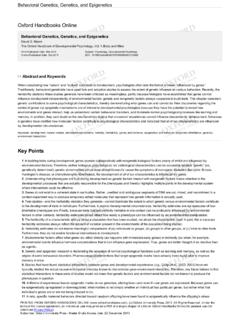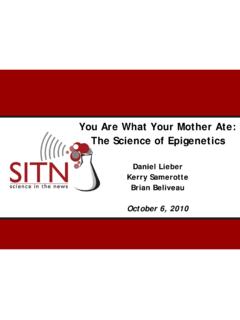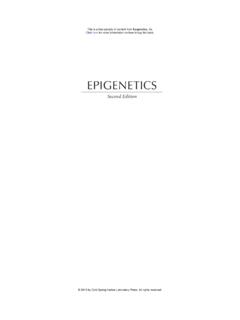Transcription of Epigenetics - Obesity - AAP.org
1 1 The Potential Role of Epigenetics in Obesity Sample Scenario 1. Case Physical Examination and ROS: Gerald is a 14 year old who is seen for a routine pediatric follow up. He has been noted to be overweight since early childhood and now weighs 80 kg (> 95%) with a height of 170 cm (75%) giving him a BMI of (>95%). He was born at 41 weeks gestation and his birth weight was His mother had poorly controlled type 2 diabetes during pregnancy and there were several episodes where her blood sugar was noted to be very high. Gerald has some respiratory distress when he was born, but required only a few days in the special care nursery and close monitoring of his blood glucose. Gerald has gained weight at or above the 95th% all of his life, maintaining his height at the 75%.
2 His pediatrician and family have discussed his eating and activity habits and he has been evaluated by a nutritionist, but so far it has been very difficult for the family to achieve the lifestyle change needed to regulate his body weight. His general health has been good but he has acanthosis nigricans and elevated triglycerides indicating early metabolic disease. He does not have dysmorphic features or obvious congenital anomalies. Family and Social History: There is a strong family history of Obesity and type 2 diabetes. His mother has type 2 diabetes and Obesity ; his father, sister, and several maternal aunts and uncles are also overweight. The family is of low income, with pediatric care covered by Medicaid. Gerald attends a public school and lunch is provided by the school.
3 Both of Gerald s parents smoke and it is suspected that both consume alcohol to a significant extent, though there has been no concern about violence in the home. Gerald is in 8th grade and gets Bs and Cs in school. There have been no major developmental or behavioral problems. Gerald s parents are not as concerned about his Obesity as are his health care providers, but they have been willing to continue the discussion with their pediatrician. 2. What Role Does Epigenetics Play in the Case? a. Diagnosis The role of Epigenetics in Obesity is not fully established but there have been animal studies and some human data in adults that show an association of epigenetic change with increased BMI and insulin resistance. Maternal Obesity , gestational diabetes, and excess maternal weight gain during pregnancy have been associated with childhood Obesity ; epigenetic change has been proposed as one mechanism for this effect.
4 The role of an environment that is Obesity promoting by virtue of lack of access to healthy food, decreased opportunities for physical activity, and unhealthy family lifestyle behaviors reinforces genetic predisposition and may contribute to further epigenetic change. 2 b. Treatment Treatment will focus on screening for Obesity related comorbidities with a thorough review of systems, and physical and laboratory screening. Use of motivational interviewing to develop goals for family based changes is a key element of treatment. 3. Epigenetic and Prevention Messages While we do not fully understand the genetic and epigenetic influences on Obesity , there is evidence that Obesity itself may set up an unhealthy intrauterine environment promoting epigenetic change which may contribute to childhood Obesity and allow this predisposition to be passed from generation to generation.
5 Obesity may be further enhanced by cumulative environmental changes over the life course. The interaction between the physical, emotional, and behavioral environment and the genome is the hallmark of epigenetic change. Obesity is a paradigm of this complex interaction. While mechanisms of epigenetic change are still being studied, the importance of maintaining appropriate nutrition during pregnancy, and glucose control in the setting of maternal diabetes, should be stressed. Genetic predisposition and epigenetic change are triggered by environmental change, and the pediatrician s focus should be on breaking the cycle of Obesity by promoting family and patient lifestyle change, promoting healthier communities, and implementing health promoting policy. Messages to the Family: We know that there are many reasons why a child can be at an unhealthy weight.
6 For example, we know that weight problems run in families. We also know that if a mother gains too much weight during pregnancy and/or starts pregnancy at a heavy weight, then changes may occur to the baby s genes to increase the chances the baby will develop Obesity . This increased risk may be passed from generation to generation. In addition, the environment including diet and activity over the years may change the risk of continuing the unhealthy weight and continuing some of changes to the genes. For these reasons, it is important to pay attention to the things we have discussed about your child. There are several things you can do that will make a difference. With regard to counseling the parents who smoke, pediatricians can offer to help them quit through an effective 30 second intervention, 2 As + R (Ask, Advise, Refer): Physicians Ask patients if they smoke, Advise them to quit, and Refer them to cessation services (1 800 QUIT NOW or to community/ internet quit resources.)
7 Resources / Links Expert Committee Recommendations on the Assessment, Prevention and Treatment of Child and Adolescent Overweight and Obesity 2007 3 ChangeTalk: Childhood Obesity is an interactive training simulation developed by the American Academy of Pediatrics Institute for Healthy Childhood Weight and Kognito Interactive to help pediatricians and other health professionals learn elements of motivational interviewing to help counsel families on childhood Obesity . It is available for free at: Further Reading Symonds ME, Budge eH, Frazier Wood AC. Epigenetics and Obesity : a relationship waiting to be explained. Hum Hered 75(2 4):90 97, 2013 Barlow SE;Expert Committee Expert committee recommendations regarding the pr prevention, assessment, and treatment of child and adolescent overweight and Obesity : summary report.
8 Pediatric2s 2007 Dec 120 Suppl 4S164 9.

